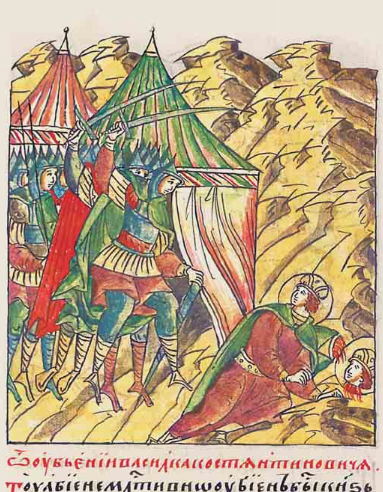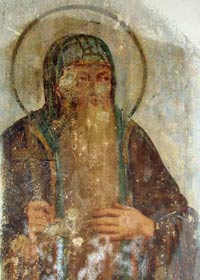|
Maria Of Chernigov
Maria Mikhailovna of Chernigov (1212-1271), was a Princess of Rostov by marriage to Prince Vasilko Konstantinovich of Rostov, and regent of Rostov during the minority of her son Prince Boris Vasilkovich of Rostov.Natalia Pushkareva, Women in Russian History: From the Tenth to the Twentieth Century', She was the daughter of Prince Saint Michael of Chernigov. In 1238, her spouse died in the Battle of the River Sit against Batu Khan Batu Khan ( – 1255),, ''Bat haan'', tt-Cyrl, Бату хан; ; russian: хан Баты́й was a Mongol ruler and founder of the Golden Horde, a constituent of the Mongol Empire. Batu was a son of Jochi, thus a grandson of Genghis Khan. ... during the Mongol invasion. She became regent and guardian of her son Boris during his minority. She is described as well educated and a wise regent. She is foremost known for her chronicle, which is a valuable source about 13th-century Rostov. References {{authority control 1271 deaths 13th-centur ... [...More Info...] [...Related Items...] OR: [Wikipedia] [Google] [Baidu] |
Vasilko Konstantinovich
Vasilko Konstantinovich (russian: Василько Константинович; 7 December 1209, in Rostov – 4 March 1238, in Sherensky forest) was the first Prince of Rostov. He was the son of Konstantin of Rostov, and the spouse of Maria of Chernigov. He died in the battle of the Sit River during the Mongol invasion of Kievan Rus' The Mongol Empire invaded and conquered Kievan Rus' in the 13th century, destroying numerous southern cities, including the largest cities, Kiev (50,000 inhabitants) and Chernihiv (30,000 inhabitants), with the only major cities escaping de ... and was succeeded by his son Boris. SourcesPravoslavie website 1209 births 1238 deaths {{russia-noble-stub ... [...More Info...] [...Related Items...] OR: [Wikipedia] [Google] [Baidu] |
Saint Michael Of Chernigov
Saint Michael of Chernigov (russian: Михаи́л Черни́говский, uk, Миха́йло Все́володович Чернігівський) or Mikhail Vsevolodovich (russian: Михаил Всеволодович, uk, Михайло Всеволодович) ( – Saray, 20 September 1246) was a Rus' prince (a member of the Rurik dynasty). He was grand prince of Kiev (now Kyiv), 1236–1240, 1240, 1241–1243); and he was also prince of Pereyaslavl (1206), of Novgorod-Seversk (1219–1226), of Chernigov (1223–1235, 1242–1246), of Novgorod (1225–1226, 1229–1230), and of Halych (1235–1236). Archaeological evidence reveals that Chernihiv towns enjoyed an unprecedented degree of prosperity during his period which suggests that promoting trade was a priority for him. Commercial interests, in part, also motivated him to seize control of Halych and Kiev because they were channels through which goods from the Rhine valley and Hungary passed to Chernihiv (Uk ... [...More Info...] [...Related Items...] OR: [Wikipedia] [Google] [Baidu] |
Batu Khan
Batu Khan ( – 1255),, ''Bat haan'', tt-Cyrl, Бату хан; ; russian: хан Баты́й was a Mongol ruler and founder of the Golden Horde, a constituent of the Mongol Empire. Batu was a son of Jochi, thus a grandson of Genghis Khan. His '' ulus'' ruled over the Kievan Rus', Volga Bulgaria, Cumania, and the Caucasus for around 250 years. Personality and appearance According to Giovanni da Pian del Carpine, Batu was "kind enough to his own people, but he is greatly feared by them. He is, however, most cruel in fight; he is very shrewd and extremely crafty in warfare, for he has been waging war for a long time." William of Rubruck described him as about the height of his lord John de Beaumont and his entire face was covered with reddish spots. Early years After his son Jochi's death, Genghis Khan assigned Jochi's appanages to his sons. The Great Khan installed Batu as Khan of the Golden Horde (also known as the Ulus of Jochi or Kipchak Khanate). Jochi's eldest son, Or ... [...More Info...] [...Related Items...] OR: [Wikipedia] [Google] [Baidu] |
1271 Deaths
1 (one, unit, unity) is a number representing a single or the only entity. 1 is also a numerical digit and represents a single unit of counting or measurement. For example, a line segment of ''unit length'' is a line segment of length 1. In conventions of sign where zero is considered neither positive nor negative, 1 is the first and smallest positive integer. It is also sometimes considered the first of the infinite sequence of natural numbers, followed by 2, although by other definitions 1 is the second natural number, following 0. The fundamental mathematical property of 1 is to be a multiplicative identity, meaning that any number multiplied by 1 equals the same number. Most if not all properties of 1 can be deduced from this. In advanced mathematics, a multiplicative identity is often denoted 1, even if it is not a number. 1 is by convention not considered a prime number; this was not universally accepted until the mid-20th century. Additionally, 1 is the ... [...More Info...] [...Related Items...] OR: [Wikipedia] [Google] [Baidu] |
13th-century Rus' Women
The 13th century was the century which lasted from January 1, 1201 ( MCCI) through December 31, 1300 ( MCCC) in accordance with the Julian calendar. The Mongol Empire was founded by Genghis Khan, which stretched from Eastern Asia to Eastern Europe. The conquests of Hulagu Khan and other Mongol invasions changed the course of the Muslim world, most notably the Siege of Baghdad (1258), the destruction of the House of Wisdom and the weakening of the Mamluks and Rums which, according to historians, caused the decline of the Islamic Golden Age. Other Muslim powers such as the Mali Empire and Delhi Sultanate conquered large parts of West Africa and the Indian subcontinent, while Buddhism witnessed a decline through the conquest led by Bakhtiyar Khilji. The Southern Song dynasty would begin the century as a prosperous kingdom but would eventually be invaded and annexed into the Yuan dynasty of the Mongols. The Kamakura Shogunate of Japan would be invaded by the Mongols. Goryeo ... [...More Info...] [...Related Items...] OR: [Wikipedia] [Google] [Baidu] |
Kievan Rus' Princesses
Kyiv, also spelled Kiev, is the capital and most populous city of Ukraine. It is in north-central Ukraine along the Dnieper River. As of 1 January 2021, its population was 2,962,180, making Kyiv the seventh-most populous city in Europe. Kyiv is an important industrial, scientific, educational, and cultural center in Eastern Europe. It is home to many high-tech industries, higher education institutions, and historical landmarks. The city has an extensive system of public transport and infrastructure, including the Kyiv Metro. The city's name is said to derive from the name of Kyi, one of its four legendary founders. During its history, Kyiv, one of the oldest cities in Eastern Europe, passed through several stages of prominence and obscurity. The city probably existed as a commercial center as early as the 5th century. A Slavic settlement on the great trade route between Scandinavia and Constantinople, Kyiv was a tributary of the Khazars, until its capture by the Varangian ... [...More Info...] [...Related Items...] OR: [Wikipedia] [Google] [Baidu] |
13th-century Women Rulers
The 13th century was the century which lasted from January 1, 1201 ( MCCI) through December 31, 1300 ( MCCC) in accordance with the Julian calendar. The Mongol Empire was founded by Genghis Khan, which stretched from Eastern Asia to Eastern Europe. The conquests of Hulagu Khan and other Mongol invasions changed the course of the Muslim world, most notably the Siege of Baghdad (1258), the destruction of the House of Wisdom and the weakening of the Mamluks and Rums which, according to historians, caused the decline of the Islamic Golden Age. Other Muslim powers such as the Mali Empire and Delhi Sultanate conquered large parts of West Africa and the Indian subcontinent, while Buddhism witnessed a decline through the conquest led by Bakhtiyar Khilji. The Southern Song dynasty would begin the century as a prosperous kingdom but would eventually be invaded and annexed into the Yuan dynasty of the Mongols. The Kamakura Shogunate of Japan would be invaded by the Mongols. Goryeo ... [...More Info...] [...Related Items...] OR: [Wikipedia] [Google] [Baidu] |
Orthodox Christian Chroniclers
Orthodox, Orthodoxy, or Orthodoxism may refer to: Religion * Orthodoxy, adherence to accepted norms, more specifically adherence to creeds, especially within Christianity and Judaism, but also less commonly in non-Abrahamic religions like Neo-paganism or Hinduism Christian Traditional Christian denominations * Eastern Orthodox Church, the world's second largest Christian church, that accepts seven Ecumenical Councils *Oriental Orthodox Churches, a Christian communion that accepts three Ecumenical Councils Modern denominations * True Orthodox Churches, also called Old Calendarists, a movement that separated from the mainstream Eastern Orthodox Church in the 1920s over issues of ecumenism and calendar reform * Reformed Orthodoxy (16th–18th century), a systematized, institutionalized and codified Reformed theology * Neo-orthodoxy, a theological position also known as ''dialectical theology'' * Paleo-orthodoxy, (20th–21st century), a movement in the United States focusing on ... [...More Info...] [...Related Items...] OR: [Wikipedia] [Google] [Baidu] |
13th-century Women Writers
The 13th century was the century which lasted from January 1, 1201 ( MCCI) through December 31, 1300 ( MCCC) in accordance with the Julian calendar. The Mongol Empire was founded by Genghis Khan, which stretched from Eastern Asia to Eastern Europe. The conquests of Hulagu Khan and other Mongol invasions changed the course of the Muslim world, most notably the Siege of Baghdad (1258), the destruction of the House of Wisdom and the weakening of the Mamluks and Rums which, according to historians, caused the decline of the Islamic Golden Age. Other Muslim powers such as the Mali Empire and Delhi Sultanate conquered large parts of West Africa and the Indian subcontinent, while Buddhism witnessed a decline through the conquest led by Bakhtiyar Khilji. The Southern Song dynasty would begin the century as a prosperous kingdom but would eventually be invaded and annexed into the Yuan dynasty of the Mongols. The Kamakura Shogunate of Japan would be invaded by the Mongols. Goryeo resist ... [...More Info...] [...Related Items...] OR: [Wikipedia] [Google] [Baidu] |





.jpg)
